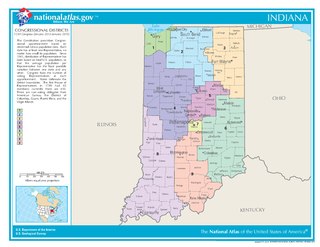
The Kennedy family is an American political family that has long been prominent in American politics, public service, entertainment, and business. In 1884, 35 years after the family's arrival from Ireland, Patrick Joseph "P. J." Kennedy became the first Kennedy elected to public office, serving in the Massachusetts state legislature until 1895. There was at least one Kennedy family member in federal elective office from 1947, when P. J. Kennedy's grandson John F. Kennedy became a member of Congress from Massachusetts, until 2011, when Patrick J. Kennedy II retired as a member of Congress from Rhode Island.

The positions of majority leader and minority leader are held by two United States senators and members of the party leadership of the United States Senate. They serve as the chief spokespersons for their respective political parties holding the majority and the minority in the United States Senate. They are each elected as majority leader and minority leader by the senators of their party caucuses: the Senate Democratic Caucus and the Senate Republican Conference.

The federal government of the United States is the national government of the United States, a federal republic in North America, composed of 50 states, a city within a federal district, five major self-governing territories and several island possessions. The federal government is composed of three distinct branches: legislative, executive, and judicial, whose powers are vested by the U.S. Constitution in the Congress, the president and the federal courts, respectively. The powers and duties of these branches are further defined by acts of Congress, including the creation of executive departments and courts inferior to the Supreme Court.
A Member of Congress (MOC) is a person who has been appointed or elected and inducted into an official body called a congress, typically to represent a particular constituency in a legislature. The term member of parliament (MP) is an equivalent term in other, unaffiliated jurisdictions.

These are tables of congressional delegations from Indiana to the United States House of Representatives and the United States Senate.

The 1988 United States House of Representatives elections was an election for the United States House of Representatives in 1988 which coincided with the election of George H. W. Bush as president. Although Bush won with a strong majority, his Republican Party lost a net of two seats to the Democratic Party, slightly increasing the Democratic majority in the House. It was the first time since 1960 that an incoming president's party lost seats in the House.

The 1980 United States House of Representatives elections was an election for the United States House of Representatives in 1980 which coincided with the election of Ronald Reagan as President, defeating Democratic incumbent President Jimmy Carter. Reagan's victory also allowed many Republican House candidates to secure elections. The Republicans gained a net of 35 seats from the Democratic Party. The Democrats nonetheless retained a significant majority, unlike the Senate elections, where Republicans gained control of the chamber. However, many Democratic congressmen from the south frequently took conservative stances on issues, allowing Republicans to have a working ideological majority for some of President Reagan's proposals during his first two years in office.

The 1978 United States House of Representatives elections was an election for the United States House of Representatives in 1978 which occurred in the middle of President Jimmy Carter's term, when the country was going through an energy crisis and facing rapid inflation. The President's Democratic Party lost a net 15 seats to the opposition Republican Party, meaning the loss of their two-thirds majority, but the retention of a rather large majority nonetheless.

The 1974 United States House of Representatives elections were elections for the United States House of Representatives in 1974 that occurred in the wake of the Watergate scandal, which had forced President Richard Nixon to resign in favor of Gerald Ford. This scandal, along with high inflation, allowed the Democrats to make large gains in the midterm elections, taking 49 seats from the Republicans and increasing their majority above the two-thirds mark. Altogether, there were 93 freshmen representatives in the 94th Congress when it convened on January 3, 1975. Those elected to office that year later came to be known collectively as "Watergate Babies." The gain of 49 Democratic seats was the largest pickup by the party since 1958.

The 1970 United States House of Representatives elections was an election for the United States House of Representatives held on November 3, 1970, in the middle of Richard M. Nixon's first term as president. His party, the Republican Party, lost a net of 12 seats to the Democratic Party, which thereby increased its majority in the House. Many viewed the results of the 1970 election as an indication of public fatigue over the ongoing Vietnam War as well as the fallout from the Kent State Massacre.

The 1968 United States House of Representatives elections were elections for the United States House of Representatives in 1968 which coincided with Richard M. Nixon's election as President. Nixon's narrow victory yielded only limited gains for his Republican Party, which picked up a net of five seats from the Democratic Party. The Democrats retained a majority in the House.

The 1920 United States House of Representatives elections were held, coinciding with the election of President Warren G. Harding, the first time that women in all states were allowed to vote in federal elections after the passage of the 19th Amendment.
This is an incomplete list of lists pertaining to the United States Congress.

The United States House of Representatives, usually referred to as the House, is the lower house of the United States Congress, with the Senate being the upper house. Together they compose the national bicameral legislature of the United States.
This is a complete list of current members of the United States House of Representatives based on seniority. For the most part, representatives are ranked by the beginning of their terms in office. Representatives whose terms begin the same day are ranked alphabetically by last name.

The 2024 United States presidential election will be the 60th quadrennial presidential election, scheduled for Tuesday, November 5, 2024. It will be the first presidential election after electoral votes are redistributed according to the post-2020 census reapportionment. Incumbent president Joe Biden has stated that he intends to run for reelection to a second term, with Vice President Kamala Harris as his running mate. Meanwhile, Donald Trump has suggested that he also has the intent to run for president for his second term, despite his loss in 2020.












